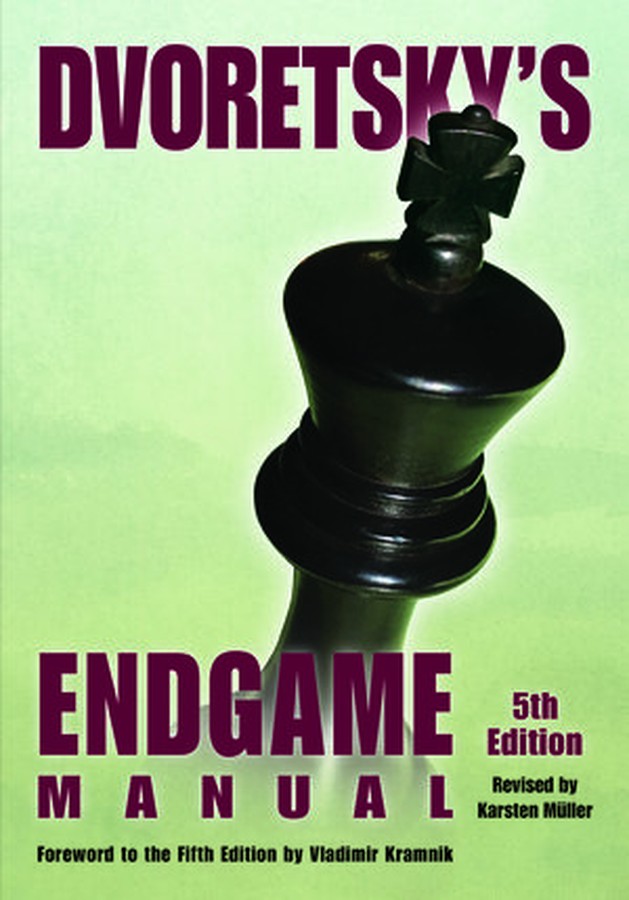| Nivå | C-D |
| Utgivelsesdato | September 2020 |
| Forfatter | |
| Pris | 440 NOK |
Dvoretsky's Endgame Manual, 5th Edition
Femte utgave av legendariske Dvoretsky's Endgame Manual kommer fire år etter Dvoretskys død, og er redigert av stormester Karsten Müller, med flere gode bidrag, og forord av Vladimir Kramnik.
Dvoretsky selv hadde startet å lage en liste over revisjoner til denne nye utgaven. Stormester Alex Fishbein startet på oppgaven med å redigere boka. Senere tilkom bidrag fra Jacob Aagaard, Erwin L'Ami og Anish Giri. Dette er en oppdatert versjon av "sluttspillforståelsen i verden"!
Boka har som tidligere noen verdifulle treningsoppgaver underveis.
Fra forordet til Kramnik:
Indeed, modern chess has changed a lot, and very often you have to make critical decisions with little time on the clock. A player is often faced with calculating in the seventh hour of play, trying to find the bestmove, for which there is often simply neither time nor energy. To handle a situation like that, it is crucialto have markers – beacons in this vast ocean of possibilities in the endgame – to know well which endingsare winning and which are not, and to have at least a rough idea of how to play them.
While it is impossible to remember everything, if a chessplayer has at his command the assessmentand the core criteria of play in theoretical endings, the benefits will be obvious.
Of course, it does not often happen that a precise position from the book appears on the board. Butyour endgame technique is certain to improve, as well as your defensive abilities. The fact is, if you knowwhich theoretical endings you should enter and which you should not, depending on the result youare trying to achieve, this is a tremendous help in making the correct decisions in many other endgames notcovered here.
I think that all chessplayers should express their gratitude to Mark Dvoretsky for undertaking suchwork, synthesizing in a practical format and in a condensed and well-explained form, the most importantendgame knowledge which every chessplayer must possess.
Naturally, in today’s world, everyone has gotten used to working with computers, and you can pull up a tablebase and see how a theoretical endgame is evaluated, what correct moves should be made. But it is impossible to attain real endgame mastery by just working with a computer. An explanation ofwhy an endgame is winning, and how to win (or save) it from a human point of view, described in wordsand in language that a person understands (as opposed to computer variations), is needed.
Forlagets egen omtale:
The Fifth Edition of a Modern Masterpiece
When it appeared in 2003, the first edition of Dvoretsky’s Endgame Manual was immediately recognized by novice and master alike as one of the best books ever published on the endgame. The enlarged and revised fifth edition is better than ever!
Here is what Vladimir Kramnik, the 14th World Champion, had to say in his foreword to the fifth edition:
“I consider Dvoretsky’s Endgame Manual an absolute must for every chess professional, and no less important even for a club player… I always recommend this book… I consider it to be one of the very best chess books published in recent times and I am very pleased with the new enhanced edition…”
German grandmaster Karsten Müller, widely recognized as one of the best endgame theoreticians in the world today, has carefully updated the fifth edition with the help of American grandmaster Alex Fishbein. The incredible instructional value of the exercises has been preserved, and the blue text used in the first four editions has been replaced with text with a light grey background.
Here’s what they had to say about the first edition:
“Dvoretsky’s Endgame Manual ... may well be the chess book of the year … [It] comes close to an ultimate one-volume manual on the endgame.” – Lubomir Kavalek in his chess column of December 1, 2003 in the Washington Post
“Dvoretsky’s Endgame Manual is quite simply a masterpiece of research and insight … Most of all, Dvoretsky's analysis is staggering in its depth and accuracy.” – John Watson at The Week In Chess.
| Innbundet? | Nei |
| Type | Bok |
| Førsteutgave år | 2003 |
| Språk | Engelsk |
| Antall sider | 440 |

